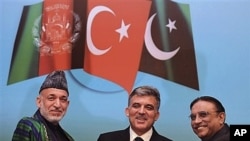In the second and final day of meetings on Afghanistan in Istanbul, Turkey, participants of the international conference focused on Afghan security and economic development as foreign troops prepare to leave the country by the end of 2014.
Addressing the conference, Afghan President Hamid Karzai warned there would be no hope of peace in his war-torn country without help from regional neighbors. Officials from some 20 countries and aid agencies who attended the conference stressed the need for cooperation, particularly on the question of security.
At a press conference with Turkish counterpart Ahmet Davutoglu, Afghan Foreign Minister Zalmai Rassoul said an important step had been taken for the region.
Dubbed the "Istanbul process," the agreement, as Rassoul describes it, commits countries in the region to resist becoming safe havens for terrorists.
"[The] process will allow countries in the heart of Asia to implement important confidence building measures, toward a more effective, broader and deeper regional cooperation that promotes security, stability and economic development in our region," said Rassoul.
Pakistan has repeatedly been accused by both Washington and Kabul of providing tacit if not direct support to the Taliban insurgency, a charge Islamabad denies.
But Islamabad is seen as playing an important role in bringing the Taliban to the peace table, and Karzai called on Pakistan to bring Taliban leaders into negotiations.
Although Karzai on Tuesday ruled out direct talks with the Taliban, Rassoul left the door open to future talks with the insurgent group.
"We know that there are people among the Taliban and others that are willing to have peace under the conditions that I have proposed to you," he said. "I am confident and optimistic [we can] achieve peace [through this] process."
Improved Afghan-Pakistan relations stressed
Many other commitments were made during Wednesday's conference in Istanbul, not only in the field of security, but also in trade and education. Observers say the two days of meetings will ultimately be judged successful is if there is the start of a thaw in the icy relations between Afghanistan and Pakistan.
Alistair Burt, Britain's Minister for Middle the East and South Asia, also stressed the importance of improved relations between the countries.
"I made it clear this morning [that] the relationship between Afghanistan and Pakistan has to be very close," said Burt. "They both have a vested issue in dealing with scourge of terrorism, and we believe they both have a vested interest in making sure that those who can abide by the conditions set out by President Karzai for inclusion in the political process should come back into the political process."
September's assassination of former Afghan president Burhanuddin Rabbani, who was heading peace efforts with the Taliban, resulted in the near collapse of relations between the countries. Kabul accuses Islamabad of being behind the Taliban suicide bomber who killed Rabbani, a charge Islamabad denies.
Pakistan President Asif Ali Zardari and the Afghan president committed to a joint investigation of the assassination on Tuesday, following a trilateral summit with Turkish President Abdullah Gul. Many consider the probe a potentially important step in rebuilding trust between the neighboring South Asian countries.
Istanbul Meeting on Afghanistan Stresses Cooperation
- By Dorian Jones




